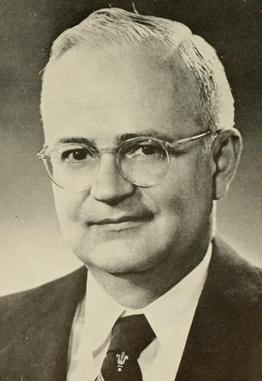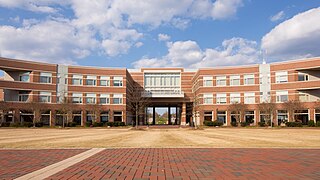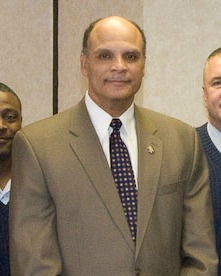
North Carolina State University is a public land-grant research university in Raleigh, North Carolina, United States. Founded in 1887 and part of the University of North Carolina system, it is the largest university in the Carolinas. The university forms one of the corners of the Research Triangle together with Duke University in Durham and the University of North Carolina at Chapel Hill. It is classified among "R1: Doctoral Universities – Very high research activity".

Marye Anne Payne Fox was an American physical organic chemist and university administrator. She was the first female chief executive of North Carolina State University in Raleigh, North Carolina. In April 2004, Fox was named chancellor of the University of California, San Diego. In 2010 Fox received the National Medal of Science.

The University of North Carolina at Charlotte is a public research university in Charlotte, North Carolina. UNC Charlotte offers 24 doctoral, 66 master's, and 79 bachelor's degree programs through nine colleges. It is classified among "R2: Doctoral Universities – High research activity".
Alvin Marcus Fountain was a former professor of English at North Carolina State University and a notable college historian.
Bruce Poulton was the tenth chancellor of North Carolina State University from 1982 to 1989.
Joab Langston Thomas was an American university administrator and scientist, who served as president of Pennsylvania State University, North Carolina State University and The University of Alabama.

John Tyler Caldwell was an American educator who presided over three universities, including North Carolina State University.

Carey Hoyt Bostian was an American educator. He was educated at Catawba College, where he earned a Bachelor's Degree in 1928, and at the University of Pittsburgh where he earned a Master's Degree in 1930 and a Ph.D. in 1933.
North Carolina State University was founded by the North Carolina General Assembly in 1887 as a land-grant college under the name North Carolina College of Agriculture and Mechanic Arts. As a land-grant college, NC State would provide a "liberal and practical education" while focusing on military tactics, agriculture and the mechanical arts without excluding classical studies. Since its founding, the university has maintained these objectives while building on them.

The Main Campus is the primary campus of North Carolina State University, located in Raleigh, North Carolina, US, inside the Beltline. Notable features of Main Campus include the Bell Tower and D. H. Hill Library. The campus is known for its distinctive red brick buildings, sidewalks, plazas, and sculptures; some are dotted with decorative brick mosaics. University Plaza is nicknamed "The Brickyard" because it is mostly a flat, open, bricked area.

Centennial Campus is a research park and educational campus owned and operated by North Carolina State University in Raleigh, North Carolina, United States. Composed of two locations, the 1,334 acres (5.4 km2) property provides office and lab space for corporate, governmental and not-for-profit entities, in addition to providing space for 75 university research centers, institutes, laboratories and departmental units. Currently, 5,000,000 sq ft (460,000 m2) of constructed space has been built. Upon completion, Centennial Campus is anticipated to have 9,000,000 sq ft (840,000 m2) of constructed space.
North Carolina State University College of Veterinary Medicine is an American educational institution located in Raleigh, North Carolina that offers master's and doctorate-level degree programs; interdisciplinary research in a range of veterinary and comparative medicine topics through centers, institutes, programs and laboratories; and external engagement through public service programs and activities.

The Wolfline is an area bus service serving the students, staff, faculty, and general public on and around North Carolina State University's campus in Raleigh, North Carolina. As of Fall 2017, Wolfline is operated by Transdev, after being operated by First Transit between 2007 and 2017, under contract with NC State's Transportation department. The Wolfline was the first mass transit organization in the state to exclusively use 'clean' diesel engines. Wolfline access is unrestricted to the public and is a zero-fare service. The preceding contractor was Veolia Transport. The Wolfline began operating in August 1980 with one route.

The D. H. Hill Jr. Library is one of two main libraries at North Carolina State University. It is the third building to house the NC State University Libraries, following Brooks Hall and Holladay Hall. The current building, situated on the Hillsborough Street edge of North Campus, is the result of four stages of construction, and houses the majority of the volumes in NC State's collection.

Wallace Carl Riddick Jr. was an American college football coach and university administrator. Riddick received his A.B. degree from the University of North Carolina at Chapel Hill and his degree in civil engineering from Lehigh University in Pennsylvania. He served as a consultant for several water projects and for the Seaboard Railroad. Riddick was also a member of the Board of Visitors for the United States Naval Academy and of several state boards and committees. Because of his advocacy on the students' behalf, Riddick was awarded with the Officer's Cross of the Order of St. Sava by King Alexander of Yugoslavia in 1931.
William Randolph Woodson is an American plant physiologist and university administrator. He is the fourteenth and current chancellor of North Carolina State University.

The James B. Hunt Jr. Library is the second main library of North Carolina State University (NCSU) and is located on the university's Centennial Campus. The $115 million facility opened in January 2013 and is best known for its architecture and technological integration, including a large robotic book storage and retrieval system which houses most of the university's engineering, textiles, and hard sciences collections. The library is named after James Baxter "Jim" Hunt Jr., the four-term 69th and 71st governor of North Carolina. NCSU Libraries is part of the Triangle Research Libraries Network (TRLN), which shares books between North Carolina State University, Duke University, The University of North Carolina at Chapel Hill, and North Carolina Central University.
The history of North Carolina Agricultural and Technical State University, the first land grant college for people of color in the state of North Carolina, can be traced back to 1890, when the United States Congress enacted the Second Morrill Act which mandated that states provide separate colleges for the colored race. The "Agricultural and Mechanical College for the Colored Race" was established On March 9, 1891 by an act of the General Assembly of North Carolina and began in Raleigh, North Carolina as an annex to Shaw University. The college made a permanent home in Greensboro with the help of monetary and land donation by local citizens. The college granted admission to both men and women from 1893 to 1901, when the board of trustees voted to restrict admission to males only. This policy would remain until 1928, when female students were once again allowed to be admitted.
Edward Bernard Fort is an American educator, who served as the 8th Chancellor of North Carolina Agricultural and Technical State University from 1981 to 1999. He is now Chancellor Emeritus and Professor of Leadership Studies.

Harold L. Martin Sr. is an American engineer, educator, former chancellor of Winston-Salem State and current chancellor of North Carolina Agricultural and Technical State University. He is the first alumnus in the history of North Carolina A&T to hold the position of Chancellor. Under his leadership, N.C. A&T has become the nation's largest historically black university (HBCU), its top-ranked public HBCU and North Carolina's third most productive public research university. It has also increased its standing as a land-grant institution and doctoral research university.